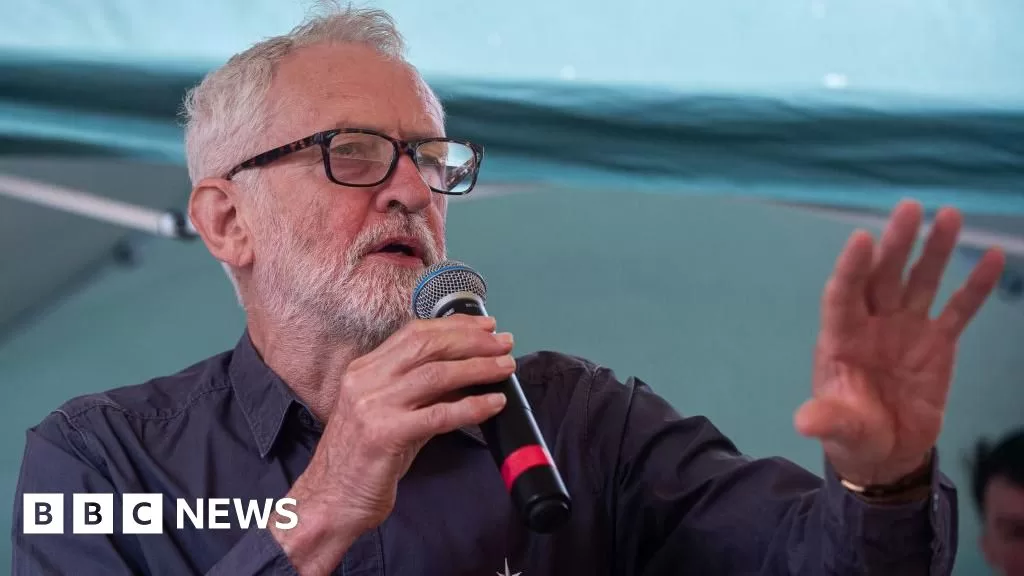Former Labour leader Jeremy Corbyn has confirmed he will stand against the party he led from 2015 to 2020.
He will contest the Islington North seat, which he has held since 1983, as an independent candidate in the general election on 4 July.
Speaking to his local Islington Tribune newspaper, he said he would be “a voice for equality, democracy and peace”.
Mr Corbyn was suspended from the Parliamentary Labour Party (PLP) in 2020 – when, in response to the Equality and Human Rights Commission report into the party’s handling of antisemitism complaints, he suggested the scale of the problem had been “dramatically overstated” by opponents.
Labour has informed Mr Corbyn he is no longer a party member.
Standing against the party automatically triggers expulsion. The former leader had remained a Labour member, despite being suspended from the parliamentary party.
Labour will announce its candidate to replace him in his north London seat on 1 June.
A shortlist of two was drawn up by party officials rather than local members.
Asked about his predecessor’s announcement, Sir Keir Starmer told BBC Breakfast “that’s a matter for Jeremy… we will have an excellent candidate”.
Mr Corbyn did not declare his intention to stand as an independent until the selection process in Islington North got under way.
He wanted to make it clear that he was being forced out and not willingly leaving the party he led until four years ago.
Writing in the Islington Tribune, Mr Corbyn said: “Local Labour Party members in Islington North have been prevented from choosing their own candidate, which has disempowered everyone in the community.
“I am appalled at the way local people have been treated. We have to stand up and defend our rights. That is why I am standing to be an independent candidate for the people of Islington North.”
His campaign is likely to provide a focus for those on the left disillusioned with Sir Keir’s leadership.
Mr Corbyn has endorsed policies rejected by his successor.
He said he would defend “a genuine alternative to the corrupt years of this Tory government”, which would include rent controls, public ownership of energy and water, the abolition of the two-child benefits cap, a green new deal, and an ethical foreign policy based on peace and human rights.
“We will not solve these crises unless we build a new kind of politics,” he added.
His supporters are hopeful he can continue to represent the seat he has held for 40 years. He had a majority of 26,188 in the 2019 general election.
But his decision to stand as an independent might, in one respect, be helpful to Sir Keir. He has argued that he has changed his party and, as if to symbolise this, his predecessor has now been formally expelled.
Left-wing pressure group Momentum hit out at Sir Keir for blocking Mr Corbyn from standing again as a Labour candidate.
Kate Dove, chairwoman of the grassroots organisation, said: “This is an almighty mess for Labour and Keir Starmer alone bears responsibility.
“Jeremy Corbyn has loyally served the people of Islington North as their Labour MP for over 40 years.
“Starmer has treated the people of Islington with contempt, setting the stage for a divisive and distracting election campaign.”
She urged the Labour leader “not to repeat this damaging debacle in Hackney [North and Stoke Newington] with Diane Abbott. Britain’s first black woman MP, who Keir Starmer rightly called a ‘trailblazer’, deserves to run as the Labour candidate, as local members voted.”
The party has been investigating comments Ms Abbott made in April 2023, when she said Irish and Jewish people and Travellers experienced prejudice, but not racism.
She withdrew her remarks and apologised “for any anguish caused”, but was suspended from the PLP.
Sir Keir told Breakfast that the process involving Ms Abbott would be “resolved pretty soon” by Labour’s national executive, because a final list of candidates had to be submitted within a matter of days [4 June].
Mike Katz, national chair of the Jewish Labour Movement, said the party “became an unsafe space for Jews under Jeremy Corbyn’s leadership” because “he refused to acknowledge the scale of antisemitism in Labour, even when the Equality and Human Rights Commission found the party guilty of breaking the law”.
“The Labour Party we see today is unrecognisable from what it had become under Corbyn, thanks to the leadership of Keir Starmer,” he added.
